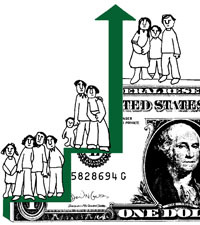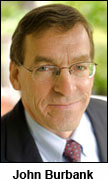OPINION
As the rich get richer, our lowest legal wage must also rise
By JOHN BURBANK
(Jan. 5, 2015) — The stock market is going great guns! That’s supposed to be the good news for this new year. It is indeed for a very small slice of people, but not really for the rest of us.
That’s because the median household income in Washington fell between 2009 and 2013 — half of households have less and half have more. The typical wage hovers around $20 an hour. Close to half a million kids in our public schools are from families with incomes of less than $44,000 for a family of four or $36,000 for a family of three.
So what is the good news for New Year’s Day, if it isn’t the stock market?
 How about the 15-cent increase in our state’s minimum wage from $9.32 to $9.47 an hour? That makes it catch up with inflation. Compare this to the federal minimum wage, which has been sitting at $7.25 since 2009.
How about the 15-cent increase in our state’s minimum wage from $9.32 to $9.47 an hour? That makes it catch up with inflation. Compare this to the federal minimum wage, which has been sitting at $7.25 since 2009.
Sixteen years ago Washington voters passed the first state minimum wage to be adjusted to inflation each year. Following our lead, eight other states — Arizona, Colorado, Florida, Missouri, Montana, New Jersey, Ohio, and Oregon — have now indexed their minimum wage to inflation.
But doesn’t this seem like peanuts compared to the stock market?
On Dec. 18, the Dow Jones average zoomed up 421 points, or 2.4%. If you had $1,000 in the market, that might amount to $24. But if you have $1,000 in any bank, you are getting .01% interest — that’s Bank of America’s checking account interest rate — which is 10 cents a year. If you have $10,000, you are in the same boat, at the same bank, and you will get $1 a year for your money.
But if you have $100,000, you might have $25,000 in the bank, and $75,000 in stock in the 30 corporations that make up the Dow Jones average. Then you get .02% from the bank, or $5 a year. But you might have made $1,800 in a day because of the increase in value of your stock.
Let’s pretend you have $1 million in the stock market. Then on Dec. 18, you could have made $24,000. If you have $10 million, you made $240,000. If you have $100 million, you made $2.4 million.
And if you are Jeff Bezos, with a net worth of $29 billion, you made $696 million… in one day. Steve Ballmer, with a net worth of $22.7 billion, may have made $545 million. Bill Gates Jr., the wealthiest person in the world, with a net worth of $81 billion, could have made $2 billion in this one day. That’s real money.
The stock market goes up and down each day. So what happened with the Dow Jones over the entire year? It went up 1,597 points or 9.7%. So for the year, while a worker with $1,000 in the bank “made” 10 cents, Mr. Bezos made $2.8 billion, Mr. Ballmer made $2.2 billion, and Mr. Gates made $8 billion.
Let’s be clear about this money. It is the automatic effect of wealth creating more wealth. If you have money, you make money.
One of the major milestones in the field of economics this year was the publication of Thomas Piketty’s book, Capital in the 21st Century. Piketty’s research focuses on the inevitable accumulation of wealth as a result of unfettered capitalist development. This accumulation undermines the egalitarian impulse of our democracy. It creates more wealth, more privilege, and more power. It is a zero-sum game that undermines the opportunity of advancement for the vast majority of people, who have seen their wages stagnate, household income fall, and their kids’ schools go underfunded.
That’s why the increase in the minimum wage is so important. It creates a barrier to even lower wages. This year’s increase of 1.59% will directly benefit about 176,000 workers in our state. People you know will see a wage increase — your neighbor, your teenage kid, the person who serves you coffee and donuts.

C ompare this to a 1.59% increase in Mr. Ballmer’s portfolio — that would give him a $400 million down payment to buy the Los Angeles Clippers. That may be good for Mr. Ballmer and for L.A., but it can’t stand up to increasing the minimum wage for workers in our own state!
John Burbank is the executive director and founder of the Economic Opportunity Institute in Seattle. John can be reached at john@eoionline.org.





